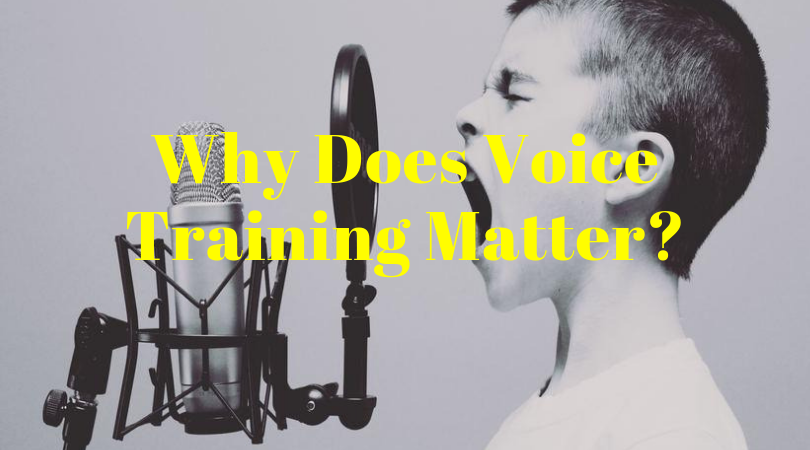Why Does Voice Training Matter?
Voice, that curious benefit that sets every individual apart, rarely gets the attention it deserves. It truly is an unfortunate habit, seeing as there are as many different tones of voice as there are individuals in the world. Put that way, voice can be easily observed as a phenomenon — it sets humans apart from animals, which cannot articulate it to produce words. Let us not even start with different sounds pronounced by speakers of different languages.
Determining the type of voice an individual will be graced with are physical features: the size of the larynx and hormones, to name a few. However, it would be unfair to disregard cultural and social factors. The environment an individual grows up in plays a significant role, too. Think in terms of different language groups and the different sounds they portend.
Voice speaks volumes of the personality uttering it: the sex, the age and the origin. Recently, some other studies have been diving even deeper, but for now, let’s stop at the basics.
Why Don’t We Like the Sound of Our Voice?
Interestingly enough, nearly 73 percent of people say they don’t like the sound of their voice (holds particularly true to voice recordings). The reason has a scientific explanation. Namely, ossicles (three bones located in the middle ear) are to blame. The eardrum vibrates against them, resulting in the vibrations being transmitted to the cochlea (a spiral-shaped structure within the inner ear), which translates that vibrational energy into electrical energy. This process is called bone conduction and is the sole “culprit” for sound generation. Processing acoustic information via the vibration of the air outside the ears is air conduction — the reason why the sounds we hear appear different to the speaker and the listener. Scilicet, sound waves transmitted via bone conduction have a lower pitch. When listening to a recorded voice, we hear the sound coming from the recorder — a higher-pitched voice.
As if that weren’t interesting enough, research also shows that the pitch is dynamic. Depending on the environment and situation (remember social and cultural factors mentioned above?), people make slight changes to the way they speak all the time. Think in terms of arguing to get an idea.
However, albeit the pitch can change, the cadence (the rhythm of the speech) rarely does. Scientists believe the reason to it is that it is not rooted in biology. Rather, it is learned and greatly depends on the upbringing and the environment.
Training Your Voice
Biology aside, there are other practical impediments. Some people think they can use their voice more effectively, notably when making presentations in front of a group. With voice training often being mistaken for the domain of musicians, what can be done?
Luckily, improving one’s voice is easier than it may appear. Speech training and voice coaching are nowadays common practices, especially when it comes to business people. What makes for an impactful presentation greatly relies on the speaker’s voice. I.e., a good speaker has a clear pronunciation, a pleasant, compelling voice and utters the right number of words accompanied with pauses in the right place. Consider hiring a public speaking coach if your position requires you to give frequent public speeches.
Benefits of Voice Training
Regularly available are multiple programs, each and every designed to suit the purpose of the speaker. Some common voice training programs for business people include voice training for business purposes, articulation/elocution training, voice and accent training, public speaking and presentation training.
What all of those have in common is that they equip the speaker with a set of skills bound to benefit them in the long run, in all kinds of situations when speaking is called for at the time. Notable examples include:
- Skills to boost a commanding and expressive voice
- Skills to boost self-confidence and the power behind the voice
- Skills to boost clear communication
- Skills to make the speaker easily distinguishable from others
- Skills to keep listeners interested and focused
- Skills to accurately convey thoughts and emotions
As a rule, speakers with a powerful voice stand out. They command a strong presence, are often respected and taken more seriously by both colleagues and friends, have more confidence, communicate more clearly, rarely get asked to repeat themselves and keep the audience continually engaged.
How Does Voice Training Work?
Due to a large number of programs being available, different programs have different approaches. Still, they all focus on improving the voice, confidence and overall “aura” of the speaker. It would be fair to say that, on top of improving the sound of a voice, trainees also learn to deal with nervousness common in case of large-group presentations.
Accordingly, a good voice coach helps the speaker concentrate on their weak spots and teaches them practical skills that will come in handy at any kind of interaction. At a glance, voice training helps with:
- Discovering weak spots and concentrating on improving them
- Learning breath and optimum pitch techniques
- Improving voice projection and resonance
- Spicing speeches with expressiveness
So, should you consider getting your voice trained? Given that a remarkable voice and articulation commands a powerful appearance, grants respect and help in all life aspects, we’d say it’s a good idea!





